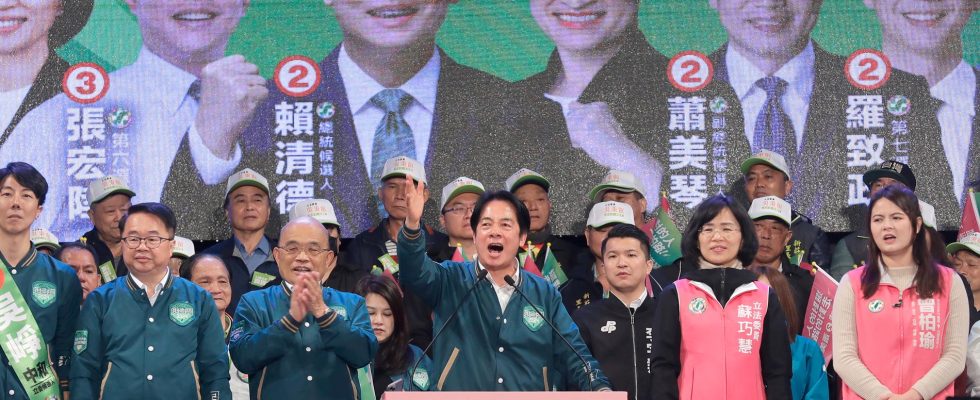unsaveSave
share-arrowShare
expand-left
full screen
chevron-rightnext
Taiwan’s vice president and presidential candidate of the DPP party, Lai Ching-Te, during an election rally on Saturday. In the latest opinion polls, he had a lead over his competitors.
1 / 2Photo: Chiang Ying-Ying/AP/TT
It has been described as a choice between war and peace – or for or against democracy.
As the Taiwanese go to the polls, the superpowers are holding their breath: the United States – which has both economic and strategic interests in Taiwan remaining free, and China – which wants to reclaim the island nation. By force if necessary.
During his time in power, Chinese President Xi Jinping has reinforced his rhetoric that Taiwan should be incorporated into the People’s Republic. By force if necessary.
Now Taiwan will choose its next president in an election where the relationship with China is one of the most important election issues. Whoever succeeds Taiwan’s outgoing president Tsai Ing-Wen, who has taken a tough stance against China and is on a direct collision course with the Chinese president, will have a major impact on the important relationship.
Blame China
Tsai Ing-Wen’s vice president Lai Ching-Te is the favorite in Saturday’s presidential election, albeit by a small margin. He represents the Democratic Progressive Party (DPP) and has described the election as “a choice between democracy and autocracy”.
Lai Ching-Te recently accused China of trying to influence the election with, among other things, propaganda, threats and psychological warfare, but he also says he wants to hold a dialogue with China. If he wins the presidential election, tensions are expected to continue, as he is expected to continue on Tsai Ing-wen’s entrenched China line.
More China-friendly options
Xi Jinping is interested in seeing a Taiwanese president with as strong ties as possible to Beijing, and according to observers, the relationship could become less tense if one of the other – more pro-China – candidates takes over the presidency.
According to the latest opinion poll, the main opposition candidate Hou Yu-Ih – representative of the Nationalist Kuomintang (KMT) Party – was not far behind Lai in popularity among voters. His party wants to bet on better relations with Beijing, and Hou Yu-Ih has called on the people to choose between war and peace. He himself considers himself to stand for peace and he warns that there is a risk that Lai’s stance towards China will bring Taiwan closer to war.
Popular among young people
There is also a third presidential candidate, Ko Wen-Je who represents the TPP. He has received unexpectedly large support among mainly young voters, although in opinion polls he has lagged far behind the two main candidates.
Both China and the United States are closely following Saturday’s election. A war in the region would hit the world economy hard, especially since Taiwanese companies completely dominate the global semiconductor market.
In addition, the island’s location is of strategic importance. If China were to occupy Taiwan, the next great power would pose a much greater threat to Asian countries allied with the United States.
FACTUAL 20 million eligible voters
The election in Taiwan will be held on Saturday 13 January and will be decided in a single round of voting.
The electoral system in Taiwan is very robust but China engages in information influence before the election. Around 19.3 million of the island’s 23.6 million inhabitants can go to the polls. About a million of them are voting for the first time.
The current ruling party is the Democratic Progressive Party (DPP) whose presidential candidate Lai Ching-Te is currently vice-president and has a rather tough attitude towards Beijing.
The major opposition party is the Nationalist Kuomintang (KMT), whose candidate is Hou Yu-Ih. The KMT is considered to have closer ties to Beijing than the DPP.
The third party, TPP, is represented by Ko Wen-Je in the election. The party has great support among young voters but has lagged far behind the other two parties in opinion polls. The party has positioned itself politically between the two more traditional parties DPP and KMT.
No opinion polls may be conducted in the last ten days before the election in Taiwan. According to the latest opinion polls, Lai had a 3 to 11 percentage point lead over Hou. Ko came last in all surveys. However, the opinion institutes have pointed out that the differences between the surveys were significant and were often within the margin of error.
The next president will be sworn in on May 20.
Read moreFACTSTaiwan
Taiwan consists of a main island and several smaller islands in the Pacific Ocean, east of the Asian mainland.
The nation functions as an independent and democratic state, but is recognized as such by only a handful of countries. China sees Taiwan as a breakaway region that should be part of China.
China does not accept that other countries have relations with both Beijing and the Taiwanese government in Taipei.
Taiwan’s 23 million people have long lived with the threat of a Chinese invasion, a threat that has intensified under Xi Jinping as president of China.
Read more
